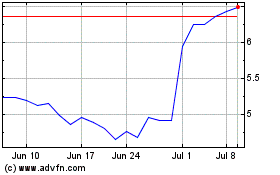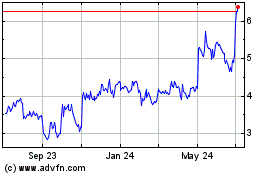Survey Reveals Global Leaders Struggle to Access and Effectively Use Data
December 12 2017 - 8:00AM
Business Wire
Organizations look to third-party vendors to
address data challenges
Pitney Bowes Inc. (NYSE:PBI), a technology provider of
innovative products, solutions and data which power commerce, today
announced the release of global research that reveals nearly half
(46 percent) of business professionals purchase third party data.
These industry leaders are using third party data to make business
decisions because they find it valuable (85 percent) and have
confidence that it is up to date (83 percent). Through the December
2017 study, Digital Is Driving The Next Generation Of Data
Marketplaces, commissioned by Pitney Bowes, and conducted by
Forrester Consulting, 800 senior-level advertising, marketing,
data, analytics and IT professionals with influence over data and
analytics decisions, were surveyed across the U.S., Canada, U.K.
and Australia.
“We’re seeing a shift in the type of data businesses are buying
today. While 83 percent of organizations still rely heavily on
first party, or owned data, third party data is gaining adoption
and recognized value,” says Bob Guidotti, EVP & President,
Pitney Bowes Software Solutions. “First party data allows
organizations to make internal business decisions, often without
complete consideration of their customer’s environment. Third party
data, however, provides an enormous opportunity to add depth of
information, enabling business leaders to make informed decisions
that go beyond the lens of their organization. As business leaders
begin to incorporate this data, it’s imperative that they work with
trusted vendors to access the most accurate and precise data to
achieve their business goals, and to avoid millions in lost revenue
from dirty data.”
Despite the growing confidence organizations have in third party
data, many are challenged to effectively use it. When asked what
the biggest challenges were to using the data, participants cited
improving the quality and accuracy of data (70 percent),
maintaining the quality of data as it changes (69 percent), and
improving the ability to detect and track changes in data (69
percent) as their top challenges.
“It can be the Achilles’ Heel if the
accuracy of the data is not great, or the accessibility of the data
is not great,” says participant VP of Customer Engagement Marketing
from a financial company. “Accuracy and accessibility are
critical.”
According to a VP of Marketing from a real
estate company, “Real-time data is the holy grail.”
Beyond the lack of confidence in third party data, 96 percent of
survey participants say they also find data difficult to acquire.
The high costs of licensing reliable data sets from third parties
(55 percent), along with the timeliness and reliability of open
data sets (54 percent), and finding the right data products in the
open market (50 percent) are the most common pain points for
organizations looking to acquire this data. Currently, the
preferred methods to access data are through APIs (81 percent) and
self-service interfaces (77 percent). In the future, 99 percent of
organizations say they will be open to purchasing data through
online data marketplaces, with 38 percent indicating they’d spend
more than $10,000 USD purchasing marketplace data.
The research shows that in all geographies, more organizations
are looking to easily access and purchase third party data, yet the
types of datasets vary by region. In the U.S., survey participants
are purchasing third party data primarily to obtain customer
behavior data (60 percent) and demographic or geo-demographic data
(60 percent). In Canada, participants indicated their interest in
digital data (51 percent), social media data (45 percent), and
customer behavior data (45 percent). In the U.K., digital data (58
percent) and social media data (59 percent) were among the most
licensed; and in Australia, participants were most interested in
transactional data (54 percent) and customer behavior data (43
percent).
In order to achieve their business priorities, survey
participants believe it’s important to maintain the quality of data
as it changes (82 percent), improve the quality and accuracy of
data (82 percent), and expand the ability to source external data
(81 percent). This is an opportunity for third party data providers
to improve their offerings, By improving these components, almost
80 percent of U.S. professionals believe they will see a notable
impact within their organization. U.K. professionals are more
skeptical though, with only 61 percent believing these improvements
will have a strong impact.
Methodology
This commissioned study was conducted by Forrester Consulting on
behalf of Pitney Bowes. Forrester Consulting surveyed 800
participants across the U.S., Canada, the U.K., and Australia.
Participants self-categorized themselves as manager-level or
higher, and work in roles across advertising, marketing, data,
analytics, and IT. Participants represent organizations within the
insurance, telecommunications, real estate and financial services
verticals that have 500 or more employees.
About Pitney Bowes
Pitney Bowes (NYSE:PBI) is a global technology and data company
powering billions of transactions – physical and digital – in the
connected and borderless world of commerce. Clients around the
world, including 90 percent of the Fortune 500, rely on products,
solutions, services and data from Pitney Bowes in the areas of
customer information management, location intelligence, customer
engagement, shipping, mailing, and global ecommerce. And with the
innovative Pitney Bowes Commerce Cloud, clients can access the
broad range of Pitney Bowes solutions, analytics, and APIs to drive
commerce. For additional information visit Pitney Bowes, the
Craftsmen of Commerce, at www.pitneybowes.com.
View source
version on businesswire.com: http://www.businesswire.com/news/home/20171212005108/en/
Pitney Bowes Inc.Emily Simmons, 843-467-1071Communications
DirectorEmily.simmons@pb.com
Pitney Bowes (NYSE:PBI)
Historical Stock Chart
From Mar 2024 to Apr 2024

Pitney Bowes (NYSE:PBI)
Historical Stock Chart
From Apr 2023 to Apr 2024
